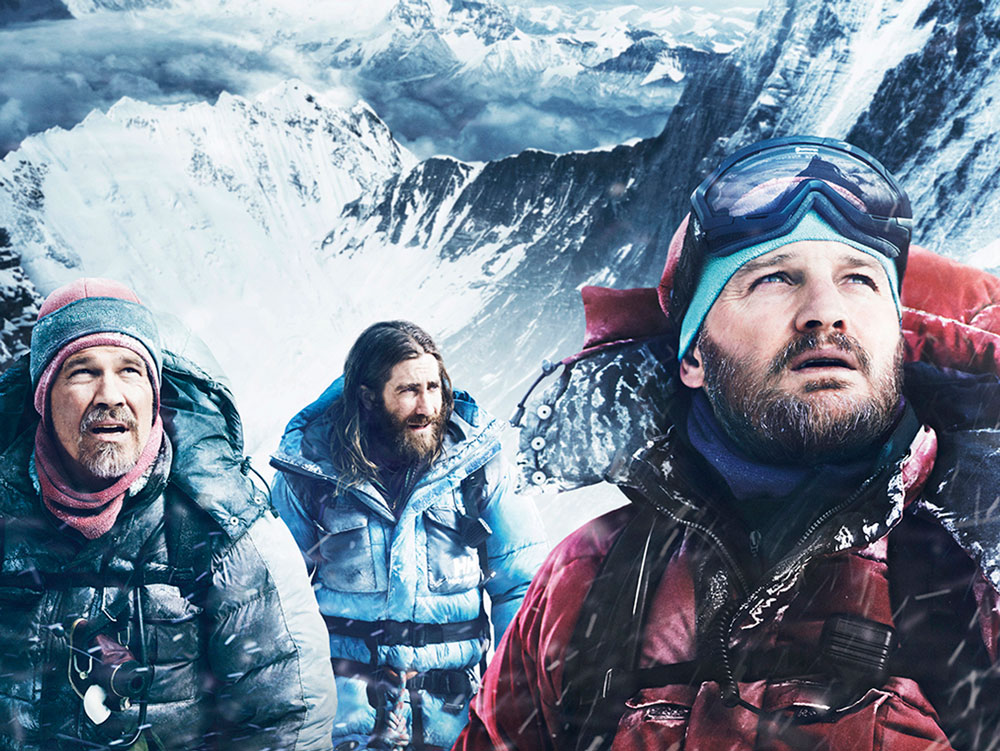
Basing a film on a true story is a difficult balancing act between reality and fiction. This difficulty is one that “Everest” has to contend with, making sure that the movie based on the 1996 Everest expedition tragedy was grounded, without being visually exaggerated to a farcical level. Thankfully, “Everest” manages to tread the line perfectly. The motion picture is centered around two teams that attempted to reach the Everest summit in 1996. One team was led by Rob Hall of Adventure Consultants, played brilliantly by Jason Clarke, the other by Scott Fischer, inhabited by Jake Gyllenhaal, who shows his chameleon nature as an acting stalwart here.
Besides the two leads, the movie boasts a truly impressive ensemble cast. Josh Brolin and John Hawkes play Beck Weathers and Doug Hansen, while Keira Knightley and Robin Wright spearhead the female cast, playing their respective spouses. Other big names in the cast include those of Sam Worthington and Michael Kelly. This in itself presents a major problem. Who is supposed to anchor the entire running time?
The first act itself tries to squeeze in as much of each character’s back story as possible through exposition, capitalizing on each character’s relationships with others, specifically with their loved ones. While it is definitely a congested landscape of actors, having the personal relationship interactions limited to Clarke’s and Brolin’s characters allowed them to stand out in their own light, while relegating the likes of Gyllenhaal, Hawkes and Kelly to supporting roles. Every actor in this film is a powerhouse in their own right, but creating that focus was a necessity to let the audience better connect with the film.
“Everest” begins with a standard, textbook approach for an adventure film. It commences with the planning phase, where each person sets off on the journey, covering everything from airport transits in New Zealand to bus rides in Nepal. This is followed by the meetup phase, where the all-star cast members get to meet each other, laying the seeds for future relationships and character development. Following this routine practice, the climbers power through, or rather struggle through from one camp to the next, slowly but surely, to reach the summit of Everest.
Watching the first half of the movie was rather tedious. After being overexposed to the flashy thrillers of mainstream Hollywood, one expects a twisted, adrenaline-inducing accident. Thankfully, “Everest” ignores these tired, cliched approaches. In fact, the more over-the-top moments can be found in the movie’s trailer, which is a good thing. “Everest” capitalizes on the less extravagant struggles the characters take.
How does a character struggle through his physical ailments to battle a blizzard and reach home? How does he or she take the next step forward while their lungs strain for oxygen in the cold air? Is he or she willing to risk his own safety to save another colleague? This is where the intentionally slow first half of the film pays off. It spends an eternity developing the characters so when time comes, the audience will be heavily invested in the people on screen, hoping for a fairy tale ending that they know will never come.
Once everything starts going downhill, literally and figuratively, the suspense suffocates the audience. It was a slow first half for the movie, but after reaching the summit, the pieces fall into place. The climbers’ fatigue sets in. A blizzard engulfs the entire mountain. Chaos slowly and insidiously enters the picture. This is exactly why “Everest” is a haunting film. The deliberately slow pace and restrained action sequences stretch out the actors’ torment and torture. The camera captures some truly arresting moments of the landscape and of the characters. Shots of the mountain and the storm dwarf the climbers. But when the camera cuts back to the actors’ ordeals, it is truly heartbreaking. Some lie frozen and etched in ice. Others lay plastered to the mountain range, their skin and the mountain’s rock become one.
“Everest” may test certain viewers’ patience, but to those comfortable with long running times, it is a great experience. It successfully juggles an expansive cast, permitting even those not on the mountain to chip in stellar performances. Keira Knightley’s pregnant Jan phoning her husband Rob, who is stranded on the mountain and fighting for his life, is a prime example. Their expressions, gestures and tone were befitting a moment few would ever find themselves in, and rightfully made them the highlights of the film. “Everest” is a remarkable movie, showcasing the epitome of human spirit and will in the face of one of nature’s most daunting challenges.

